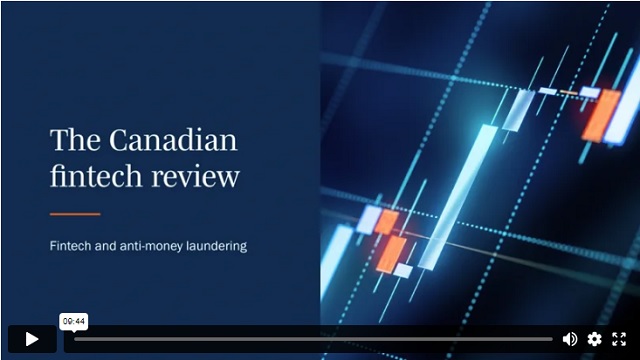Entities operating in the financial space are deemed as presenting a higher risk of money laundering and terrorist financing.
In this video, Hailey Schnier and Brigitte Goulard share insights into Canada's anti-money laundering legislation, and how fintechs can ensure they are meeting compliance expectations. They discuss:
- the compliance obligations to prevent anti-money laundering
- key legislation that applies
- advice for fintechs navigating AML regulations
Click here to see other videos and webinars in this series.
Video transcript
Brigitte Goulard (00:06): Welcome to our third fintech video, and today's topic is anti-money laundering.
Brigitte Goulard (00:15): So let's start with the general question of, "How does Canada make sure that money laundering doesn't happen within its borders?"
Hailey Schnier (00:23): Sure. So Canada has two main pieces of legislation that deal with money laundering and terrorist financing in order to prevent such occurrences. The first is the Proceeds of Crime (Money Laundering) and Terrorist Financing Act, which I will refer to as the Proceeds of Crime Act due to the long name of the Act. And that act applies to certain reporting entities. So certain entities that Canada has determined are higher risk for money laundering and terrorist financing. So for example, financial institutions or money services businesses. And the Act sets out compliance obligations for these entities. The next Act is the Criminal Code, which applies to all persons in Canada, and it contains general anti-money laundering provisions as well as anti-terrorist financing provisions. With respect to money laundering, the Criminal Code prohibits dealing in the proceeds of crime as well as aiding, abetting and facilitating in the dealing and proceeds of crime.
Brigitte Goulard (01:24): So who would be the regulatory body that is responsible for overseeing compliance?
Hailey Schnier (01:29): FINTRAC administers the Proceeds of Crime Act. FINTRAC is an independent regulatory body that ensures compliance with the Act, so it assists reporting entities to understand their compliance obligations through guidance and policy interpretations on its website. It also enforces compliance through its power to conduct examinations of certain reporting entities, and also to levy administrative monetary penalties such as fines if it determines there is noncompliance. It also assists law enforcement agencies such as the RCMP and CSIS in prosecuting financial crimes. And the essence of FINTRAC is that it takes the reports submitted by the reporting entities, and it monitors financial transactions to determine if money laundering and terrorist financing is occurring.
Brigitte Goulard (02:21): I understand that in June 2021 there was an overall comprehensive review of the legislation and that some of these requirements would have an impact on fintech. So can you tell us a little bit about what happened in June 2021 and the impact it's had on the fintechs?
Hailey Schnier (02:38): Sure. So there were many significant changes in June 2021, but there were three main amendments that would apply to fintechs. So the first is that an entity that is dealing in virtual currency is now considered an MSB, a money services business, or an FMSB, a foreign money services business. This means that an entity that deals in currency exchange, so the exchange of fiat currency to virtual currency, the other way around, or of one virtual currency to another virtual currency as well as virtual currency transfer services. So largely this could apply to a cryptocurrency, trading or exchange platform. Now these entities are seen as money services businesses or foreign money services businesses, meaning they have to register with FINTRAC and they're now subject to the Proceeds of Crime Act. The second major amendment is that now foreign money services businesses are subject to a wide, vast range of compliance obligations that previously applied to money services businesses. So a foreign money services business is an entity that directs its services to customers in Canada and offers such services to customers in Canada, but does not necessarily have a place of business in Canada. So this could target virtual currency exchanges or trading platforms that actually have no offices or place of business in Canada. But they now have become subject to the Proceeds of Crime Act and have to register as a foreign money services business in Canada. Third major amendment is that now any entity that receives a large virtual currency transaction has recordkeeping obligations and reporting obligations. If it receives the equivalent of $10,000 in one transaction of virtual currency, or if it receives a series of transactions that add up to $10,000 in a 24-hour period.
Brigitte Goulard (04:31): So what other types of compliance obligations would a fintech need to keep track of and their compliance officers need to keep track of in order to comply with the legislation?
Hailey Schnier (04:42): So while there's vast amount of compliance obligations under the Proceeds of Crime Act, I can give a high-level summary. So as an MSB or an FMSB, as mentioned, these fintechs will have to register with FINTRAC. Otherwise, if they're a fintech that is subject to the Proceeds of Crime Act as well as for FMSBs and MSBs, they will have to implement a compliance program. So this can include compliance policy, appointing a CAMLO which is a chief anti-money laundering officer having training for employees. They also will have to do "KYC" for clients when they're opening accounts and verifying their clients' identities. They have to monitor transactions and look for suspicious transactions. If they identify these transactions, they have to report them to FINTRAC. And there is another range of reports that they'll have to make to FINTRAC. They also have recordkeeping obligations. So they have to keep certain records, and as I mentioned, FINTRAC has the power to examine these entities to make sure that they are complying with these obligations.
Brigitte Goulard (05:50): And I understand that there will also be new types of organizations that will be subject to the anti-money laundering legislation. And you said that in April of this year, the act was again amended to include those types of institutions. Can you tell us a little bit more about that?
Hailey Schnier (06:08): Sure, yeah. So in April 2022, two new types of entities were brought under the realm of the Proceeds of Crime Act. So the first is crowdfunding platforms, and this was largely in response to the blockades in Ottawa in early 2022. There actually was a temporary order for 30 days at that time that required crowdfunding platforms and certain payment services providers that I'll call "PSPs". Under the Proceeds of Crime Act, they had to register as MSBs or FMSBs at the time. And so what these amendments are doing is actually making it permanent that crowdfunding platforms will be subject to the Proceeds of Crime Act. So this will apply to transactions in virtual and fiat currency. And what's interesting about this is that now a crowdfunding platform has to verify the identity of persons or entities that are receiving crowdfunding services, and also anyone who donates $1,000 in virtual or fiat currency to a crowdfunding platform. So now with respect to payment services providers, PSPs, certain PSPs will now be subject to the Proceeds of Crime Act as well. So this largely applies to those PSPs providing merchant services as well as payment services processors for such things as rent, payroll services, tuition, mortgage payments. And what's most interesting about this change is that FINTRAC actually retracted its previous policy interpretation that specifically said that these entities would not be considered MSBs. And so now all of these types of entities are subject to the Proceeds of Crime Act, they have to register as MSBs or FMSBs. And it just seems like there's a lot of uncertainty with these changes now.
Brigitte Goulard (07:53): So it appears that being told by FINTRAC that you don't have to worry about anything doesn't necessarily mean that you can close your eyes. So it's very important for the fintechs to take the challenge of compliance very seriously.
Brigitte Goulard (08:11): So can you give us like maybe three pieces of advice that you would give to the fintechs who are now facing all of these obligations?
Hailey Schnier (08:18): So other than calling us for advice, which is a given, I would say the first piece of advice I would give is for fintechs to take a look at the FINTRAC website. As I mentioned, there's guidance and there's policy interpretations and it's quite user-friendly now. And look and see if you are subject to the Proceeds of Crime Act because it's important to know that if you are considered an MSB or an FMSB, that you need to register with FINTRAC and otherwise you still need to comply with the Act and all the obligations that I previously mentioned. The next thing I would say is, even if you don't fall into the bucket of entities that are subject to the proceeds of Crime Act, fintechs may wish to voluntarily comply with the Act by virtue of contractual relationships with financial services entities that would require you to essentially comply with the Act in giving you services or in receiving services from you.
Hailey Schnier (09:15): The third thing I will mention is that since the definition of MSBs and FMSBs and the application of the Proceeds of Crime Act to fintechs is expanding at a rapid pace, to just keep all of the legislative changes in mind. Keep checking to see if there are updates, because even if you're not subject to the Proceeds of Crime Act now, you may become subject to it in the future.
The content of this article is intended to provide a general guide to the subject matter. Specialist advice should be sought about your specific circumstances.


